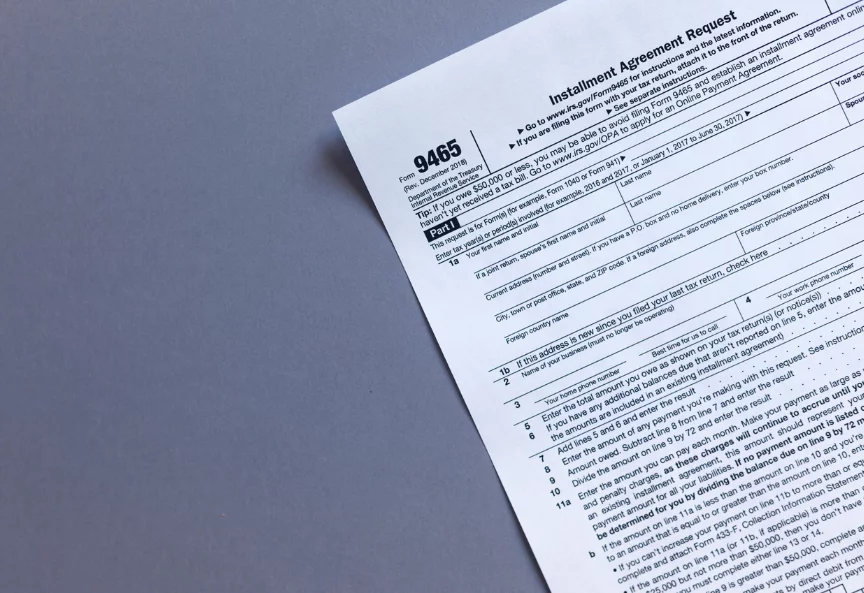Understanding form 9465 Installment Agreement Request

Each year, many Americans find themselves in a situation where they owe more income tax than they can immediately pay. For these taxpayers, the IRS offers a solution through Form 9465: Installment Agreement Request, which allows them to pay their taxes in monthly installments instead of a lump sum. It’s important to note that penalties and interest on the overdue balance will continue to accrue until the taxes are fully paid.
Key Takeaways
– Purpose of Form 9465: This form helps taxpayers who cannot pay their taxes all at once by setting up an installment plan if they meet certain conditions.
– Eligibility: Taxpayers owing $50,000 or less can often apply online, avoiding the need to file Form 9465.
– Penalties and Interest: These will continue to accrue on the overdue balance until paid off.
Who Can File Form 9465?
Taxpayers unable to pay their tax obligation in full can file Form 9465 to set up a monthly installment payment plan if they meet the following conditions:
– The taxpayer owes at most $10,000.
– They have filed all past tax returns.
– They have not entered an installment agreement in the past five years.
– They cannot pay the taxes in full when due.
– They can pay the entire outstanding balance within three years.
For those owing more than $50,000, Form 433-F, Collection Information Statement, must be submitted along with Form 9465, which cannot be done online.
Where to Get Form 9465
Form 9465 can be downloaded from the IRS website. If you owe $50,000 or less, you can use the IRS’s online payment agreement application to avoid filing the form.
Who Should Not File Form 9465?
Individuals already under an installment agreement with the IRS or those in bankruptcy who want to make an offer-in-compromise should contact the IRS directly at 1-800-829-1040 instead of filing Form 9465.
Special Considerations When Filing Form 9465
Setting up an Installment Plan
Repayments are generally required to be completed within 72 months or less. The IRS charges a one-time setup fee for installment plans, varying based on the method of payment:
– $31 for online agreements with direct debit.
– $107 for non-direct debit payments set up online.
– $130 for non-direct debit payments set up in person or by phone.
– $225 for non-online agreements and non-direct debit payments.
Low-income individuals making direct debit payments can have the $31 fee waived. Those who do not use direct debit pay a reduced cost of $43, which may be waived entirely.
If the IRS initially denies a reduced fee, taxpayers can request reconsideration by filing Form 13844, Application for Reduced User Fee for Installment Agreements.
There is an $89 fee to modify or terminate the agreement ($43 for low-income taxpayers). Interest and penalties will continue to apply to the unpaid balance.
Penalties for Unpaid Taxes
The IRS charges a daily compounding interest rate equal to the short-term federal funds rate plus 3%, calculated quarterly. A failure-to-pay penalty of 0.5% on the unpaid balance each month (up to 25%) applies. The penalty is reduced to 0.25% per month for those on an installment plan.
Penalties and interest can add up to 9% to 12% per year, so paying more than the minimum monthly payment whenever possible is advisable.
Example of Penalties
Consider Fred, who filed his 2022 taxes in April 2023 and owes $7,000. He submits Form 9465 and establishes a 36-month installment plan. If the federal funds rate is 3%, the IRS will charge Fred 6% interest on the balance. With a 0.5% failure-to-pay penalty, Fred faces another 6% annually in penalties until the balance is paid off. This totals 12% of $7,000 annually, although the amount decreases as he repays the principal.
Methods of Payment
Taxpayers can pay via personal checks, cashier’s checks, money orders, direct debit, credit card, or the Electronic Federal Tax Payment System (EFTPS). Payments must be made by the specified date each month. Those mailing payments should be made at least seven to ten business days before the due date to ensure timely receipt.
The IRS website lets taxpayers modify their installment agreements online, including payment dates and terms. Authorized representatives can also access the site to make changes on behalf of their clients.
Benefits of Installment Plans
The primary benefit of an installment plan is that it gives taxpayers more time to pay off their federal taxes in an orderly manner. If the terms of the agreement are honored, the IRS or private collection agencies will cease collection efforts.
Additional Information
Eligible individuals can receive a six-month extension for filing their tax returns and possibly paying their tax bills under certain financial hardships.
How to Set Up a Payment Plan with the IRS
To set up an installment payment plan, you can apply online through the IRS Online Payment Agreement tool or by phone or mail by submitting Form 9465.
Interest and Penalties on Payment Plans
A short-term payment plan is typically free of charge. Long-term payment plans have varying setup fees depending on the payment method. These fees are reduced for low-income earners. Note that accrued penalties also need to be paid.
Electronic Filing
Form 9465 can be filed electronically if the amount owed is less than $50,000.
Difference Between Forms 9465 and 433-F
Form 433-F details how much interest and penalties are owed, while Form 9465 establishes an installment plan to pay those fees. Taxpayers owing more than $50,000 must submit both forms.
The Bottom Line
Taxpayers with outstanding tax bills don’t have to panic. The installment agreement application process is relatively quick and painless. However, penalties and interest will add up over time. Making arrangements upfront is better to avoid further complications and additional charges.
You can access Form 9465 from the IRS website or by calling 1-800-829-1040.



